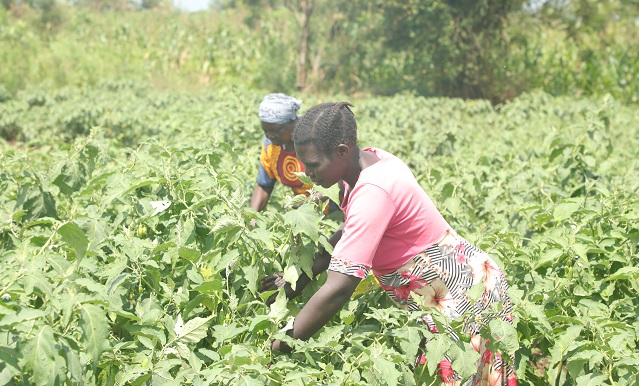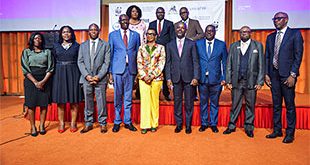
Kiryandongo, Uganda | Patricia Akankwatsa | In the sprawling Kiryandongo district of Uganda, a transformative initiative is rewriting the story of resilience and opportunity for refugees and host communities alike. With funding from the Dutch Embassy, the Food and Agriculture Organization (FAO), in collaboration with Self Help Africa, launched a one-year project in June 2023 that focuses on improving and diversifying incomes, food security, and livelihoods for 800 farmers, many of whom have faced displacement and hardship.
Florence Akwero, a 32-year-old widow and refugee from South Sudan, is one of the 433 refugees participating in the project. Florence fled to Uganda in 2016, leaving behind the devastation of war. Settled in Cluster J of Kiryandongo Refugee Settlement, her initial years were marked by struggle.
“Life was very hard,” Florence recalls. “I had no stable source of income or food for my children. Every day was a battle to survive.”
Everything changed when Florence joined one of the project’s Farmer Field Schools (FFS).
Through hands-on training, she learned good agronomic practices for passion fruits, tomatoes, onions, and maize. She also gained skills in post-harvest handling, financial literacy, and climate- smart agriculture.
Training enables participants to diversify their agricultural and entrepreneurial activities. Many beneficiaries are successfully cultivating passion fruits, maize, and other crops, while others have ventured into livestock and shop ownership. The acquired skills are often replicated in their homes, contributing to diversified income sources.
Today, Florence’s small plot of land is a vibrant garden of maize and vegetables as well as poultry. With the income from her harvests, she has not only fed her family but also sent her two children to school.


“This project has given me the knowledge and tools to turn my life around,” Florence says, her voice filled with pride. “I can now dream of a better future for my children.”
The project provides both material support and capacity building. Participants receive farm tools, vegetable seeds, food crops, and poultry (chicks and necessary feeds). Training on crop management, particularly passion fruit value chain development, is a key focus. Other support includes seedlings for crops like maize, green grains, and passion fruits, with an emphasis on training beneficiaries in poultry care and horticulture.
It has reached six clusters in the refugee settlement (Clusters G, C, D, I, J, and P) and three sub- counties in the host community (Mutunda, Nyamahasa, and Kigumba). It brought together 800 farmers—433 refugees and 367 host community members—into 33 farmer groups, providing each with training and support to improve their agricultural practices and livelihoods.
Christine Labong, the chairperson of Odokomit village, has seen firsthand how the project has uplifted her community.
“The FAO intervention has completely transformed our lives here in Odokomit,” she says.
“The agricultural training has boosted our yields and incomes, and the water infrastructure has been a game-changer. This project has given us hope and pride in our work.”
“It has also sparked community-driven initiatives. For example, with proceeds from passion fruit sales, our group purchased a grinding mill, addressing a significant need within the community.
This reduced the distance residents needed to travel for milling services, easing daily household burdens,” Labong added.
“We plan to acquire a tricycle to facilitate the transport of agricultural produce.” A foundation of the project was the establishment of 25 solar-powered shallow wells, enabling 49 farmer groups to access water for agricultural and domestic use, even during the dry season.
The wells are maintained by water user committees, ensuring sustainability. Farmers were also provided with 33 demonstration gardens and high-quality passion fruit seedlings, with two mother gardens established to supply seedlings in the future.
Additionally, the project emphasized financial empowerment. All 33 farmer groups transitioned into Village Savings and Loan Associations (VSLAs), with 100% engagement in weekly savings and loan activities. Farmers were linked to agro-input dealers and bulk buyers, ensuring they could sustain their businesses after the project’s conclusion.
For participants like Demonica Edward, the benefits extended beyond agriculture. Demonica, a refugee in Kiryandongo, has leveraged her farming income to start making and selling liquid soap.
“I used to struggle to make ends meet, but now I’ve diversified my income,” she says. “The training gave me confidence, and my farm gave me the resources to start my business.”
For Florence, Christine, and Demonica, the project has been nothing short of life-changing. It has turned uncertainty into opportunity and hardship into hope. As Florence sums it up:
“We are no longer defined by our struggles. Thanks to this project, we are building a future filled with possibilities.”
As the project came to a close in June 2024, its impact is evident in the improved livelihoods, food security, and unity among refugees and host communities.
Project achievements
- 94% of households adopted at least two good agricultural practices.
- 86% of households embraced climate-smart agricultural technologies.
- 97% of farmers are now applying post-harvest handling techniques.
- 800 households accessed quality staple crops and vegetable seeds, and 33 farmer groups are prepared to graduate to Farmer Business Schools.
 The Independent Uganda: You get the Truth we Pay the Price
The Independent Uganda: You get the Truth we Pay the Price


